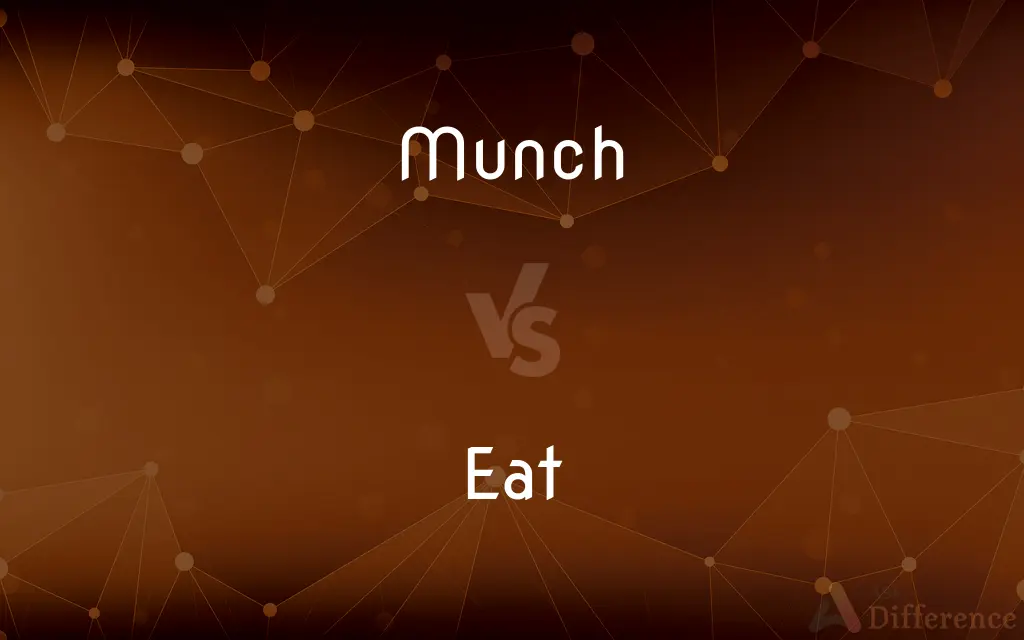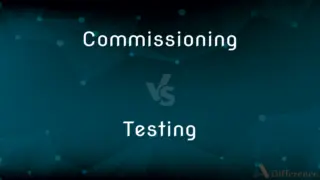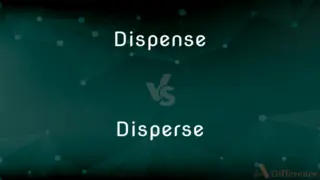Munch vs. Eat — What's the Difference?
By Tayyaba Rehman & Urooj Arif — Updated on April 5, 2024
Munch refers to eating with a specific noisy chewing sound, while eat encompasses all forms of consuming food, quietly or otherwise.

Difference Between Munch and Eat
Table of Contents
ADVERTISEMENT
Key Differences
Munching and eating are actions related to the consumption of food, but they highlight different aspects of this process. Munching specifically describes the act of eating in a way that produces a noticeable chewing sound, often associated with crunchy or hard foods. It implies a certain enjoyment and leisure in the eating process, with an emphasis on the auditory experience. On the other hand, eating is a more general term that covers the entire range of consuming food, regardless of the sound made or the type of food being consumed.
When someone says they are munching on something, it usually suggests that the food has a texture that makes a sound when bitten or chewed, such as chips or raw vegetables. The term 'munch' brings to mind a casual, perhaps even slightly indulgent, approach to eating. Whereas, eating is a neutral term that simply denotes the act of consuming food, whether it be a quick snack, a formal meal, or anything in between, without any implication about the manner or sound involved.
The distinction also lies in the connotation and context in which these terms are used. Munching often carries a lighter, more casual connotation, suitable for informal settings or when referring to snacking. Eating, however, is versatile, used in both formal and informal contexts, and does not necessarily convey any particular attitude towards the consumption process.
In terms of linguistic usage, munching can add a descriptive layer, giving the listener or reader a clearer picture of the scene, including the type of food and the manner of its consumption. Eating, being a broader term, is less descriptive on its own and often relies on additional context or adjectives to convey a more complete picture of the eating experience.
Understanding the nuance between munching and eating enhances communication, especially in contexts where the manner of eating is relevant or when one wishes to convey a particular mood or atmosphere related to food consumption. While all munching is eating, not all eating involves the distinctive sound and casual enjoyment implied by munching.
ADVERTISEMENT
Comparison Chart
Definition
To eat with a noisy chewing sound
To consume food
Connotation
Casual, often implies enjoyment and specific sound
Neutral, encompasses all forms of consuming food
Context
Usually refers to snacking or eating crunchy foods
Applies to any meal or food consumption situation
Sound Involved
Yes, specifically refers to noisy chewing
No specific sound implied
Implied Texture
Crunchy, hard foods that make a sound when bitten or chewed
Any texture, from soft to hard, without specific reference
Compare with Definitions
Munch
Reflects a specific auditory aspect of eating.
The room was quiet except for the sound of munching.
Eat
Neutral term, used in various contexts.
Can we eat out tonight?
Munch
To chew food loudly or with a crunching sound.
She munched on celery sticks while studying.
Eat
The act of consuming food.
We eat breakfast at 7 a.m.
Munch
Munching often implies eating leisurely and with enjoyment.
We munched on popcorn during the movie.
Eat
Can be used in formal and informal settings.
They were invited to eat at a formal dinner.
Munch
Implies the consumption of foods with a certain texture.
They munched on carrot sticks as a healthy snack.
Eat
Eat encompasses all methods and manners of food consumption.
She eats quickly due to her tight schedule.
Munch
Typically associated with casual eating scenarios.
He munched on chips during the break.
Eat
Does not imply any specific food texture.
He eats both soft and hard foods despite his dental issues.
Munch
To chew food audibly or with a steady working of the jaws.
Eat
Put (food) into the mouth and chew and swallow it
Eat up all your peas
He was eating a hot dog
She watched her son as he ate
Munch
To eat with pleasure.
Eat
Light food or snacks
These make great party eats
Munch
To chew or eat (food) audibly or with pleasure.
Eat
To take into the body by the mouth for digestion or absorption.
Munch
(often with "on") To chew with or without a grinding, crunching sound, and with the mouth closed.
Jim was munching on a biscotti.
Eat
To take in and absorb as food
A plant that eats insects.
A cell that eats bacteria.
Munch
To eat vigorously or with excitement.
Watching old Bill munch his pancakes makes me hungry!
Eat
To include habitually or by preference in one's diet
A bird that eats insects, fruit, and seeds.
Stopped eating red meat on advice from her doctor.
Munch
A location or restaurant where good eating can be expected.
Sally is having a breakfast munch at her place!
Eat
To destroy, ravage, or use up by or as if by ingesting
"Covering news in the field eats money" (George F. Will).
Munch
(colloquial) An act of eating.
We had a good munch at the chippy.
Eat
To erode or corrode
Waves that ate away the beach.
An acid that eats the surface of a machine part.
Munch
Food.
Eat
To produce by eating
Moths ate holes in our sweaters.
Munch
(BDSM) A casual meeting for those interested in BDSM, usually at a restaurant.
Eat
(Slang) To absorb the cost or expense of
"You can eat your loss and switch the remaining money to other investment portfolios" (Marlys Harris).
Munch
To chew with a grinding, crunching sound, as a beast chews provender; to chew deliberately or in large mouthfuls.
I could munch your good dry oats.
Eat
(Informal) To bother or annoy
What's eating him?.
Munch
Norwegian painter (1863-1944)
Eat
Vulgar slang To perform cunnilingus or anilingus on. Often used with out.
Munch
A large bite;
He tried to talk between munches on the sandwich
Eat
To consume food.
Munch
Chew noisily;
The children crunched the celery sticks
Eat
To have or take a meal.
Eat
To exercise a consuming or eroding effect
A drill that ate away at the rock.
Exorbitant expenses that were eating into profits.
Eat
To cause persistent annoyance or distress
"How long will it be before the frustration eats at you?" (Howard Kaplan).
Eat
To ingest; to be ingested.
Eat
(ambitransitive) To consume (something solid or semi-solid, usually food) by putting it into the mouth and swallowing it.
He's eating an apple. / Don't disturb me now; can't you see that I'm eating?
Eat
(intransitive) To consume a meal.
What time do we eat this evening?
Eat
To be eaten.
It's a soup that eats like a meal.
Eat
To have a particular quality of diet; to be well-fed or underfed (typically as "eat healthy" or "eat good").
Eat
To use up.
Eat
To destroy, consume, or use up.
This project is eating up all the money.
Eat
To consume (an exception, an event, etc.) so that other parts of the program do not receive it.
Eat
To damage, destroy, or fail to eject a removable part or an inserted object.
The VHS recorder just ate the tape and won't spit it out.
John is late for the meeting because the photocopier ate his report.
Eat
To consume money (or other instruments of value, such as a token) deposited or inserted by a user, while failing to either provide the intended product or service or return the payment.
The video game in the corner just ate my quarter.
Eat
To cause (someone) to worry.
What's eating you?
Eat
To take the loss in a transaction.
Eat
(ambitransitive) To corrode or erode.
The acid rain ate away the statue.
The strong acid eats through the metal.
Eat
To be very good; to rule; to rock.
You ate that performance!
Eat
(colloquial) Something to be eaten; a meal; a food item.
Eat
To corrode, as metal, by rust; to consume the flesh, as a cancer; to waste or wear away; to destroy gradually; to cause to disappear.
Eat
To take food; to feed; especially, to take solid, in distinction from liquid, food; to board.
He did eat continually at the king's table.
Eat
To taste or relish; as, it eats like tender beef.
Eat
To make one's way slowly.
Eat
Take in solid food;
She was eating a banana
What did you eat for dinner last night?
Eat
Eat a meal; take a meal;
We did not eat until 10 P.M. because there were so many phone calls
I didn't eat yet, so I gladly accept your invitation
Eat
Take in food; used of animals only;
This dog doesn't eat certain kinds of meat
What do whales eat?
Eat
Use up (resources or materials);
This car consumes a lot of gas
We exhausted our savings
They run through 20 bottles of wine a week
Eat
Worry or cause anxiety in a persistent way;
What's eating you?
Eat
Cause to deteriorate due to the action of water, air, or an acid;
The acid corroded the metal
The steady dripping of water rusted the metal stopper in the sink
Common Curiosities
Can munching be considered a form of eating?
Yes, munching is a specific form of eating, characterized by the sound produced during chewing.
What does it mean to munch?
To munch means to eat with a noticeable chewing sound, often associated with enjoyment and crunchy foods.
What is the definition of eat?
Eat is a general term for consuming food, without specifying the manner or sound of consumption.
Is the sound of chewing necessary to describe eating?
No, the sound of chewing is not necessary to describe eating in general, but it is a key characteristic of munching.
Do munch and eat convey different textures of food?
Yes, munch typically implies crunchy or hard textures, whereas eat does not specify the food's texture.
How do munch and eat differ in context?
Munch is often used in casual, snack-related contexts, while eat is a versatile term used across various eating situations.
Does eating always involve food?
Yes, eating by definition involves consuming food.
Can animals munch?
Yes, animals can munch, especially when they eat foods that produce a crunching sound.
Are there foods that cannot be munched?
Yes, soft or liquid foods that do not produce a crunching sound cannot be munched.
Can the term eat be used in formal contexts?
Yes, eat is neutral and can be used in both formal and informal contexts.
Can munching have negative connotations?
In some contexts, munching might be viewed negatively, especially if the noise is considered inappropriate or disturbing in certain settings.
Is it correct to use munch when referring to eating silently?
No, munch specifically implies making a noise while chewing, so it's not suitable for silent eating scenarios.
How does the connotation of munch differ from that of eat?
Munch has a casual, enjoyable connotation, often related to snacks, while eat is neutral and encompasses all eating actions.
Why might someone choose to use munch instead of eat in a description?
Someone might choose munch for its descriptive quality, emphasizing the sound and casual nature of the eating process.
How does the usage of eat vary in different cultures?
The usage of eat may vary in formality, timing, and associated customs across different cultures, but it universally refers to the act of consuming food.
Share Your Discovery

Previous Comparison
Commissioning vs. Testing
Next Comparison
Dispense vs. DisperseAuthor Spotlight
Written by
Tayyaba RehmanTayyaba Rehman is a distinguished writer, currently serving as a primary contributor to askdifference.com. As a researcher in semantics and etymology, Tayyaba's passion for the complexity of languages and their distinctions has found a perfect home on the platform. Tayyaba delves into the intricacies of language, distinguishing between commonly confused words and phrases, thereby providing clarity for readers worldwide.
Co-written by
Urooj ArifUrooj is a skilled content writer at Ask Difference, known for her exceptional ability to simplify complex topics into engaging and informative content. With a passion for research and a flair for clear, concise writing, she consistently delivers articles that resonate with our diverse audience.














































